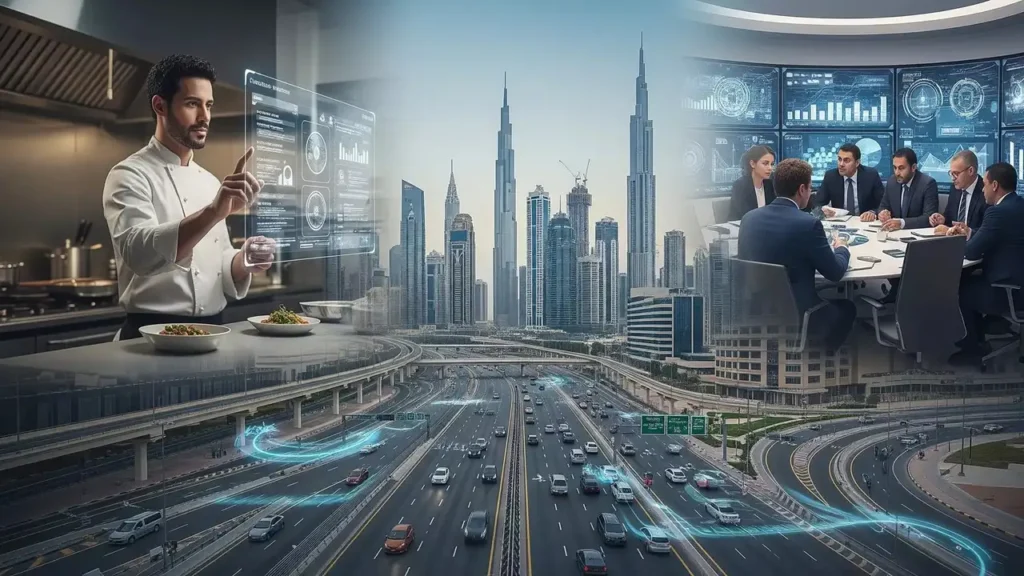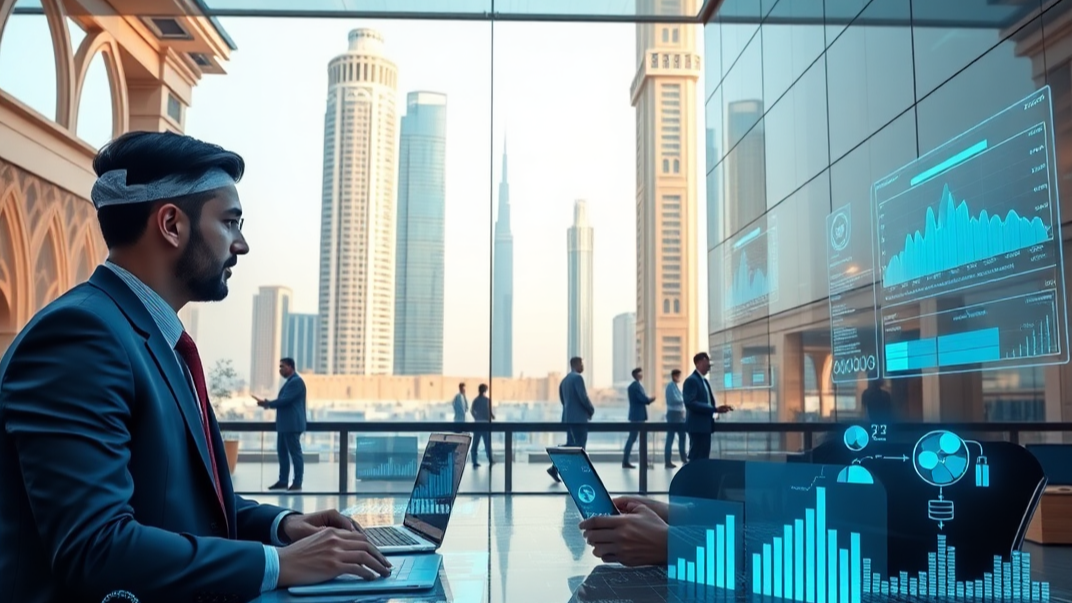Artificial Intelligence is no longer just a buzzword in the Gulf. AI in UAE has quietly but powerfully stepped into the heart of everyday life—from smart kitchens preparing your meals to intelligent systems directing traffic, hospitals powered by predictive algorithms, and even digital governance shaping how citizens interact with the state.
In fact, the UAE has been one of the most ambitious countries in adopting AI technologies, with a dedicated Minister of State for Artificial Intelligence since 2017. This bold move positioned the Emirates as a global leader in embracing the future. Today, AI is not just experimental—it is running many systems people use daily.
Let’s explore how AI in UAE is revolutionizing kitchens, traffic, healthcare, and government services.
AI in UAE Kitchens: Smart Cooking Made Simple
Imagine walking into your kitchen in Dubai, and breakfast is already half-prepared—thanks to AI-powered appliances. Smart ovens recognize the type of food inside, adjust cooking times, and send notifications to your phone when your meal is ready.
Examples of AI in UAE kitchens:
- Food delivery platforms like Talabat and Careem are using AI to predict customer cravings and suggest meals.
- Smart kitchen appliances powered by IoT (Internet of Things) integrate with AI assistants like Alexa to automate cooking.
- Waste reduction systems in restaurants use AI to track food spoilage and optimize supply.
In luxury hotels across Dubai and Abu Dhabi, AI kitchens are already standard. Robots assist chefs with repetitive tasks such as chopping, stirring, and frying. For consumers, this means faster service, consistent quality, and reduced food waste.
AI isn’t just about convenience—it’s reshaping how food businesses operate. Restaurants using AI report up to 20% cost savings by predicting demand more accurately.

AI in UAE Traffic: Smoother, Safer Journeys
If you’ve driven through Dubai or Abu Dhabi recently, you may not realize how much AI was guiding your journey. From traffic light optimization to accident detection, AI in UAE traffic systems is already making roads safer and smarter.
Key AI traffic technologies in UAE:
- Smart traffic lights in Abu Dhabi use AI to reduce congestion by up to 25%.
- Dubai Police AI cameras detect violations such as tailgating, phone use, and sudden lane changes in real time.
- Self-driving taxis, tested by Dubai’s Roads and Transport Authority (RTA), rely heavily on AI navigation.
- AI-powered drones are used in Sharjah to monitor traffic density during peak hours.
The UAE aims to have 25% of all transport autonomous by 2030, a vision that combines AI with robotics and clean energy. By reducing human error, AI in traffic management is expected to cut accident rates dramatically.
AI in UAE Hospitals: Saving Lives with Smart Healthcare
Healthcare is one of the most sensitive areas where AI can make a real difference—and AI in UAE hospitals is already proving its worth.
Applications in healthcare:
- Predictive diagnosis: AI systems at Cleveland Clinic Abu Dhabi help detect early signs of heart disease and cancer.
- Robot-assisted surgeries: Minimally invasive surgeries are guided by AI-powered robotic arms for precision.
- Virtual nurses: AI chatbots handle patient inquiries, reducing waiting times in clinics.
- Smart imaging systems: AI scans X-rays and MRIs faster than radiologists, offering doctors quick insights.
The COVID-19 pandemic accelerated this adoption. UAE hospitals used AI to track infection clusters, manage testing, and even deploy robots for disinfection.
Patients benefit from shorter wait times, more accurate diagnoses, and personalized treatment plans. For doctors, AI tools are reducing workload and improving efficiency.
By 2030, the UAE expects AI in healthcare to save billions of dirhams annually in medical costs.
AI in UAE Government: Smarter Services for Citizens
Government services once meant long queues and paperwork. But with AI in UAE governance, that experience has been transformed into a digital-first model.
Key AI-driven government initiatives:
- Dubai’s Smart Police Stations (SPS): 100% AI-powered, offering services like filing reports and paying fines without human staff.
- AI chatbots like “Mahboub” in Dubai provide 24/7 answers to citizen queries.
- UAE Pass app uses AI for secure digital identity, replacing physical documents.
- AI in immigration speeds up passport control with facial recognition and predictive screening.
The UAE was the first country in the world to appoint a Minister for AI, showing how seriously it treats this technology. Today, AI-driven systems handle everything from visa approvals to public safety analytics.
This shift isn’t just about convenience—it’s about building trust. Citizens and residents now get faster, more transparent services while the government saves time and resources.
Why the UAE Is Betting Big on AI
The UAE’s National AI Strategy 2031 aims to make the country a global hub for artificial intelligence. This strategy covers:
- Economy: Boosting productivity and creating AI-powered industries.
- Education: Training citizens in data science and AI.
- Healthcare: Using AI to improve patient care and reduce costs.
- Transportation: Deploying autonomous vehicles and smart mobility systems.
- Government: Making services paperless, predictive, and fully digital.
By investing billions in AI startups, research, and infrastructure, the UAE is positioning itself as a Silicon Valley of the Middle East.
Benefits and Challenges of AI in UAE
Benefits:
- Faster and more efficient services.
- Reduced human errors in healthcare and traffic.
- Cost savings for businesses and government.
- Creation of new jobs in AI and tech sectors.
- Better quality of life for citizens.
Challenges:
- High costs of implementing advanced AI systems.
- Need for skilled talent in AI engineering and data science.
- Balancing innovation with privacy and data security.
- Ethical concerns about AI replacing human jobs.
Despite challenges, the UAE sees AI as a net positive force—and is preparing its workforce to adapt to the AI-driven future.
The Future of AI in UAE
In the next decade, we can expect AI to play an even greater role in UAE life. Some upcoming developments include:
- Fully autonomous taxis by 2030 in Dubai.
- AI-based smart kitchens integrated with nutrition apps to monitor citizen health.
- AI hospitals with robot doctors assisting in critical surgeries.
- Predictive governance, where AI analyzes data to anticipate citizen needs before they arise.
By embracing AI across every sector, the UAE isn’t just adopting technology—it’s shaping the global conversation on how AI can enhance modern life.
Conclusion
AI in UAE is more than a futuristic idea—it’s already here, running kitchens, traffic, hospitals, and even government services. From helping chefs reduce waste to enabling doctors to save lives, from easing commutes to speeding up government paperwork, AI is making everyday life smoother and smarter in the Emirates.
The country’s bold vision and heavy investment in artificial intelligence mean that by 2031, the UAE will not just be a consumer of AI but a global leader in developing and exporting it.
Do follow us: Instagram
Read More: Best Japanese Food in Abu Dhabi: Top Spots for Sushi, Takoyaki and Miso Soup



